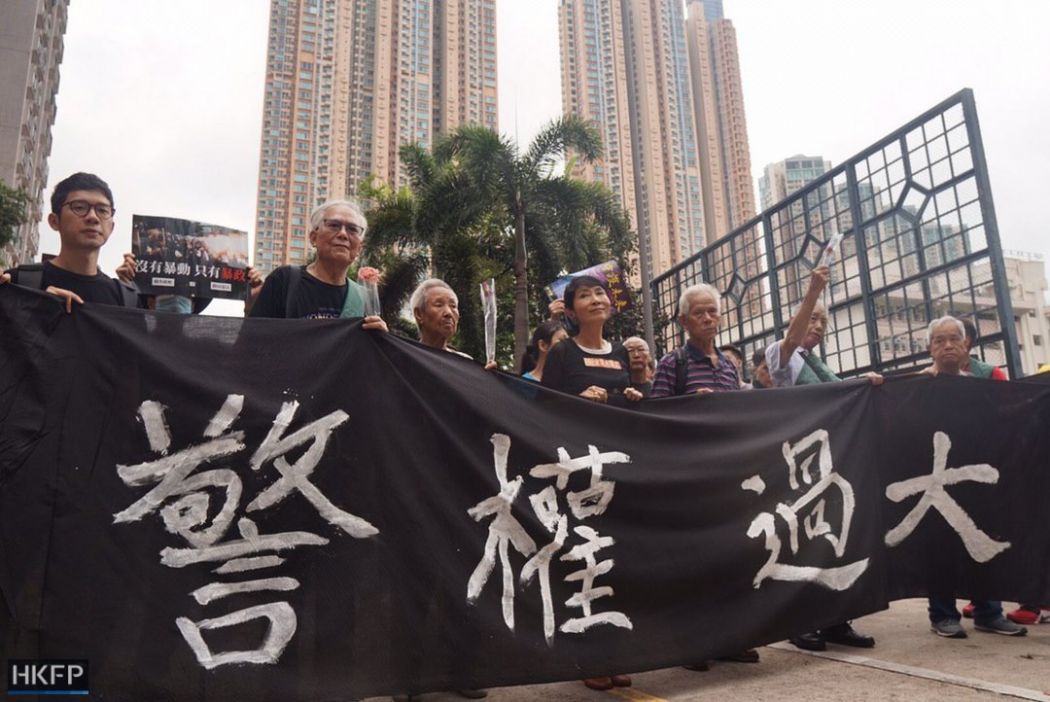In order to prevent the Legislative Council debate on the controversial extradition bill on June 12, protesters surrounded the complex and clashed with police. Some threw bottles and metal bars at officers as police responded with tear gas, rubber bullets and sponge grenades.
At least 39 people were arrested over clashes on suspicion of rioting, disorderly behaviour in a public place, unlawful assembly, or assaulting a police officer, among other reasons. Five of the 39 were arrested in hospitals.

The incident sparked the demand for an amnesty for all arrested protesters.
Heavy sentence
As of early December, more than 6,100 people have been arrested in connection to the ongoing protests since June – more people than there are prisoners currently in jail. Among the 978 prosecuted, 517 have been charged with rioting, which carries a maximum ten-year jail sentence.
Lo Kin-man, who was present at the February 2016 Mong Kok unrest, threw a water bottle and sand at police officers. He was sentenced to seven years in jail, the most serious punishment in all of the protest-related cases.

But the problems facing those arrested have not been limited to the prospect of imprisonment. Many of those arrested have complained of police brutality, unduly lengthy legal procedures, and other issues.
Alleged police abuse
Amnesty International released a report in September stating that the Hong Kong police force have used “reckless tactics and retaliatory violence” against protesters.
Explainer: Hong Kong’s Five Demands – an independent investigation into police behaviour
One man told the NGO that, when he refused to answer a question during his arrest in the New Territories in August, officers beat his legs, put his knees against his chest and threatened to break his hands if he tried to protect himself. An officer then forced his eye open and shone a laser beam into it, according to the detainee.

Another man who suffered multiple fractures to his arm during his arrest in August said he was denied medical care for five hours when in detention, despite asking to be immediately taken to hospital. Two other interviewees described instances where they were restrained on the street with zip-ties and made to inhale tear gas for long periods.
In another case, a woman arrested during a protest accused a female officer of conducting an unreasonable strip search without gloves, and of using a pen to force her to spread her legs.
Other cases of alleged sexual assault by the police included an allegation that a male officer hit a female detainee’s breast, and another allegation of two officers taking turns to abuse a male protester.

The police have consistently denied misconduct, saying that officers use the minimum force necessary and exercise a high level of restraint during protests.
Time-consuming process
When protesters are arrested or charged, they may be allowed bail by police or a court. But if they are allowed bail, it usually comes with conditions, such as a curfew and a requirement to report every week to the police.
Court procedures may take a long time. Even if arrested protesters win their cases, they may face an appeal by the government, all the way up to the Court of Final Appeal, which may take years.

It may also take years for the police to arrest and charge protesters. Nine leaders of the 2014 pro-democracy Occupy protests were only charged in 2017, only to be finally sentenced in April this year.
Meanwhile, the bail conditions and lengthy judicial process often make it difficult for arrested people to find jobs.
Pro-democracy parties have said that, after their landslide win in the District Council election in November, they will hire protesters as staff members, without considerations over whether they were arrested, prosecuted or convicted.

Fleeing over fear
Some protesters who have not been arrested still may fear arrest in the future. Brian Leung, who took off his mask to make a speech inside the Legislative Council on July 1 after it was stormed by demonstrators, left Hong Kong shortly afterwards to continue his PhD at the University of Washington, though he was not being sought by police.
Dozens of other Hong Kong protesters involved in the storming of the Legislative Council have fled to Taiwan in fear of unfair prosecution.

At least a dozen protesters have been charged with offences allegedly committed during the July 1 incident.
Partial amnesty
Former Legislative Council president Jasper Tsang has suggested that instead of a full amnesty – which the government has repeatedly refused to offer – a partial amnesty plan could be implemented. He said the government could pardon protesters who were arrested for non-serious crimes. The government could also set a certain date and grant amnesty for offences committed before that date, he suggested.
The idea has not been entirely ignored by the authorities. According to RTHK last month, the government has examined whether to offer pardons after the judicial process on a case-by-case basis. The mechanism could be carried out under Article 48 of the city’s Basic Law, which allows the chief executive to “pardon persons convicted of criminal offences or commute their penalties.” Nevertheless, Chief Executive Carrie Lam has maintained – for months – that offering any kind of amnesty would send the wrong signal and would be an affront to the rule of law.
Hong Kong Free Press relies on direct reader support. Help safeguard independent journalism and press freedom as we invest more in freelancers, overtime, safety gear & insurance during this summer’s protests. 10 ways to support us.

